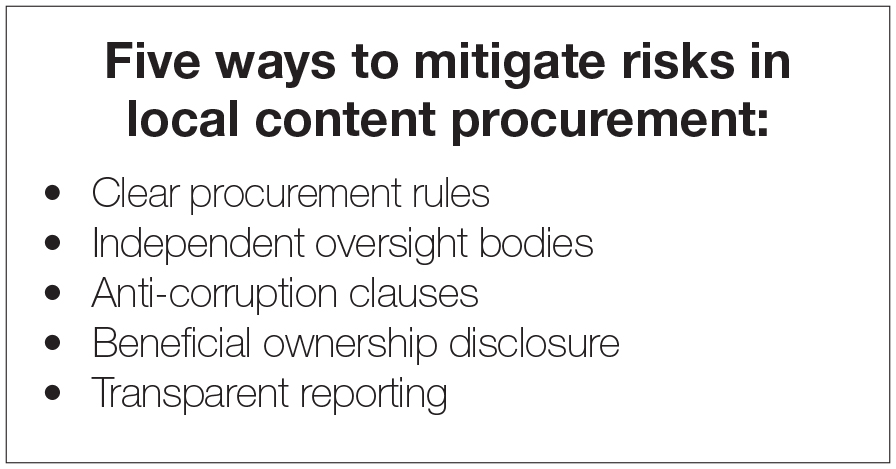Recently, newspapers have been publishing opinion pieces on local content in the oil and gas sector that do not even mention the corruption risks involved (e.g. Namibia Energy Sector Needs Local Content Guidelines by NJ Ayuk, p. 7 of The Namibian on 4 April).
It is clear that there is a huge appetite among Namibian entrepreneurs to be involved in the supply chains for the burgeoning oil and gas sector in Namibia.
Since Shell and TotalEnergies announced oil discoveries off the southern coast in early 2022, the question on many people’s lips has been: how will Namibians benefit from an industry that will be dominated by international oil companies (IOCs)?
The main boon will be a huge cash infusion into government coffers through the payment of royalties and taxes. It has already been estimated that government’s revenues will at least double once production starts. But Namibians will also want to see citizens participating in meaningful ways as the suppliers of goods and services for the oil industry.
The text of the Ministry of Mines and Energy’s local content policy (dating from late 2021) acknowledges that “poorly designed local content policies can inadvertently lead to non-compliance, value leakage and rent seeking activities.”
Mines and Energy Minister Tom Alweendo recognised the risks when he opened last May’s local content workshop: “We must be fair and transparent with our employment procedures, procurement processes and in exercising oversight over the policy implementation. The more we are transparent in our operations, the higher the chance of realising the objectives of this local content policy.”
The Ministry’s policy document requires oil and gas licence holders to produce an annual local content plan which will include a section on procurement detailing the involvement of local firms in supplying goods and services.
The definition of ‘local’ in the policy is that at least 51 percent of the equity in a business must be owned by Namibians. Some participants at the May 2023 workshop wanted the words ‘previously disadvantaged’ to be inserted to ensure that benefits flow to black-owned businesses.
The local content policy is likely to result in revisions to the Petroleum Act and its regulations as well as the model petroleum agreement that the MME signs with IOCs. It is also possible that a stand-alone local content law will be necessary.

Risks galore
It is now widely acknowledged that local content requirements create a number of significant corruption risks.
According to Transparency International, politicians and officials can abuse their power and influence to use local content procurement requirements to benefit their associates and family members. At the same time IOCs could pay bribes and kickbacks to local companies to serve as ‘fronts’ and make it look like they are meeting targets for local involvement. Such arrangements can be used to channel funds to politicians, government and public enterprise officials, their families, or affiliates. Sometimes the companies selected by IOCs include politically connected people who are essentially being paid to seek favours from ruling politicians.
Local content policies are often seen as fertile ground for rent-seeking middlemen who contribute nothing of value but are only interested in getting rich quick.
Preventing corruption in local content requires a set of measures aimed at strengthening transparency and accountability systems. Transparency International has recommended action in the following areas:
-Anti-corruption clauses in contracts that spell out the behaviour expected from the contracting partners and send a strong signal with regard to the government’s or companies’ commitment to fight corruption.
-Dedicated and independent oversight bodies for local content policy including overseeing the selection of pre-approved local suppliers that can be vetted to ensure they have clean track records and are not linked to the politically connected.
-Procurement regulations in local content requirements should guarantee fairness throughout the procurement process and include measures to avoid overpricing, bid rigging and cartel activity.
-Disclosure of beneficial ownership is instrumental to ensure that local content contracts are not awarded to political groups and that ‘front’ companies are not being used to circumvent local content requirements.
-Transparent reporting on local content covering the number of local personnel employed, goods and services procured by foreign and local companies and beneficiaries of local content policies are essential to assess whether local content rules are implemented in a way that supports the achievement of their objectives and whether corruption, mismanagement or other wrongdoing took place.
Licence holders, including IOCs, must also take a series of actions, including, carrying out their own due diligence and risk assessments of local content suppliers and signing up to and supporting anti-corruption provisions in contracts.
- * Graham Hopwood is the Executive Director of the Institute for Public Policy Research (IPPR).
Stay informed with The Namibian – your source for credible journalism. Get in-depth reporting and opinions for
only N$85 a month. Invest in journalism, invest in democracy –
Subscribe Now!






